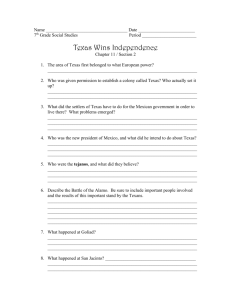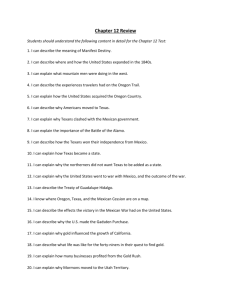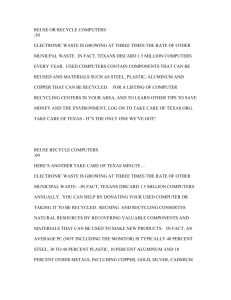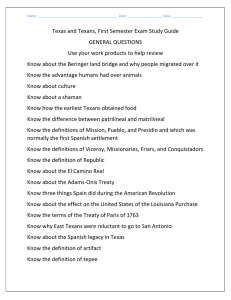Presentation by Maurice Emsellem, the Policy Co-Director
advertisement
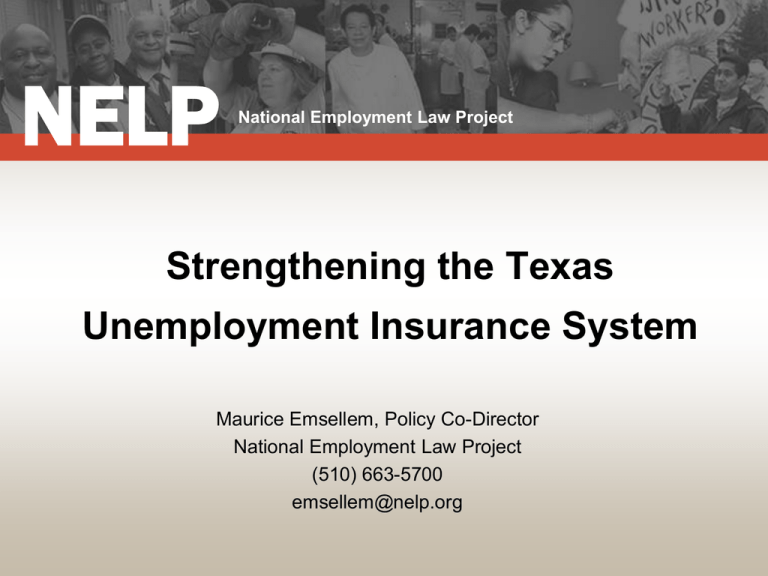
NELP National Employment Law Project Strengthening the Texas Unemployment Insurance System Maurice Emsellem, Policy Co-Director National Employment Law Project (510) 663-5700 emsellem@nelp.org The Nation’s Economic Challenge • Economists predict a prolonged “U” shape recession lasting two years (versus 10 months average post-WWII). • Deep recession, with unemployment rates of 8.0% to 8.5% (or over 10% if the auto industry, employing over 130,000 Texans, collapses). • Unemployment rates may not peak until two years after the recession ends, which was the case during the last two recessions. • Significant decline in the share of families with enough resources to cover a spell of unemployment (down from 51% to 44% in just three years). • By the end of 2009, the percent of the population in poverty will increase from 12.5% to at least 14.3%. www.nelp.org 2 Major Increase in Texas Unemployment • Texas unemployment rate up 30% in the past year, to 5.6% (657,000 Texans unemployed, up 166,000). • Texans collecting unemployment insurance in the past year increased by 30% (360,000, up from 277,000). • 69,000 Texans exhausted their state benefits during the last six months, up 30% compared to last year. www.nelp.org 3 The Critical Role of Unemployment Insurance • Stimulates the economy in those communities hardest hit by joblessness ($2.15 for every dollar circulating in the economy). • From July to November, Texans already collected $215 million in federal Emergency Unemployment Compensation benefits (before the new EUC expansion) • Stabilizes housing (46% of housing delinquencies are now due to unemployment, and 40% of benefits spent on housing). • Alleviates economic hardship (without the help of unemployment benefits, poverty increases by 50% for the long-term jobless). • Maintains quality jobs (e.g., UI benefits increase earnings and increases access to jobs with health care). www.nelp.org 4 One in Five Unemployed Texans Collects UI Benefits (Ranking 50th) www.nelp.org 5 Major Gaps in Texas UI Benefits Limit Economic Stimulus • Outdated Work-History Requirement: Latest 3-6 months of earnings not counted toward eligibility for UI in Texas, denying benefits to large numbers of low-wage workers. GAO finds lowwage workers twice as likely to be unemployed and one-third as likely to collect UI benefits. • Full-Time Work-Search Requirement: Once qualified, Texans have to seek full-time employment to keep collecting UI benefits, denying benefits to large numbers of women workers with families looking for part-time employment. GAO finds part-time workers about half as likely as full-time workers to collect UI benefits. • Compelling Family Reasons for Leaving Work: Texas law recognizes verified medical conditions and domestic violence as valid reasons for leaving work, but not separations that result from workers having to leave work to follow their spouse to a new job (except military families). www.nelp.org 6 21 States Adopt the “Alternative Base Period” (ABP) www.nelp.org 7 ABP Critical to Low-Wage Workers (Michigan Case Study) Percent Collecting UI Due to Michigan's ABP (2003) 17.4% 1.6% Low-Wage Workers Higher-Wage Workers www.nelp.org • • • In 2003, there were 26,219 ABP recipients. ABP payments averaged $232 a week ($4,600 a year), compared with $90 in TANF averaged per week. ABP benefits totaled $86 million in 2003 (equal to 25% of TANF payments). 8 Major Increase in Coverage Outweighs Increased ABP Costs 7% Share of State Total 6% 6.5% 6.2% 5.5% 5.2% 4.7% 5% Percent of UI Claims Percent of UI Costs 4.7% 4% 3.1% 2.7% 3% 2.1% 1.7% 2% 1.4% 1.1% 1% 0% Michigan Maine New Jersey Georgia www.nelp.org Virginia North Carolina 9 Nearly Half the States Extend UI Benefits to Part-Time Workers www.nelp.org 10 Part-Time Benefits Critical to Women Workers (Maine Case Study) Maine's Part-Time Worker UI Reform (2004) 70.5% 29.5% Women Men www.nelp.org • Maine’s work-search rule permits history of parttime work or “good cause” related to child care or dependent care. • 886 workers collected UI under Maine’s part-time UI law (2.7% of all UI claims). • Collected $1.8 million in benefits, averaging $2,078 per worker. • Another 920 part-time workers were paid UI after looking for full-time work. 11 Economic Recovery Legislation Modernizes the UI Program (S.1871/H.R. 2233) • The Unemployment Insurance Modernization Act (UIMA) provides $7 billion in “Reed Act” funds to states that qualify for incentive payments to modernize their UI programs. • All states qualify for $500 million in supplemental funding to pay for administration of the program, responding to prior cuts in federal funds and rising caseloads. • Program improvements would help an estimated 500,000 workers, targeting the long-term unemployed and the gaps that deny UI to low-wage, part-time and women workers. -One-third share requires “alternative base period.” -Remaining two-thirds share requires two of the following: Parttime provision, family-friendly voluntary quit provisions, extra UI for workers in training (Senate bill also includes dependent allowances and 26-week uniform duration of state benefits). www.nelp.org 12 UIMA Generates Significant Funding for Texas to Modernize UI • Texas automatically collects $38 million in federal administrative funding under the UIMA (36% of the Texas 2008 federal grant). • Texas receives $530 million in total incentive funds, which would cover more than 6.5 years of key UI reforms (including the alternative base period, parttime worker benefits and “trailing spouse”). • Texas receives $177 million in incentive funds to adopt the ABP, covering more than three years of benefits and helping 28,000 workers a year (CPPP estimates these workers will collect an average of 10 weeks of benefits in Texas at $136 per week). www.nelp.org 13 Texas UI Funding Driven by Tax Cuts, Not Responsible Financing • Texas has consistently suffered from insolvency well before the recessions produced major increase in benefits. • Major tax cuts in Texas undermine need to raise revenue in good times to pay benefits during recessions (“forward funding”). -$300 million in rebates in 2007 -average tax rate declined from 1.74% in 2004 to .98% in 2008 -74% of employers paid the minimum tax rate of .26% (nationally, 28% of employers pay the minimum state tax). • The $9,000 taxable wage base in Texas has not been increased since 1989. • TWC projects an October 2009 trust fund balance of $730 million (or half the current balance), triggering a tax increase to fill a $141 million gap required by state law. www.nelp.org 14 Insufficient Texas Reserves to Pay Benefits for One Year at Recession Levels www.nelp.org 15 Source: U.S. Department of Labor Office of Workforce Security Division of Fiscal and Actuarial Services. UI Data Summary, Third Quarter 2008 Insolvency in Texas & U.S. Predates the Recession www.nelp.org 16 Texas Fails to Expand Contributions During Good Economic Times Major Economic Expansion, But No Increase in Contributions www.nelp.org 17 Record Low UI Taxes In Texas www.nelp.org 18 Source: U.S. Department of Labor Employment and Training Administration. Unemployment Insurance Financial Data Handbook Texas Trust Funds Reserves Fail to Keep Pace with Benefits Paid www.nelp.org 19 *2008 figures reflect revenues and benefits for the 12-month period ending September 2008. 2008 Trust Fund Balance as of Oct. 2008 Source: US DOL Employment and Training Administration, Unemployment Insurance Financial Data Handbook. Time for Texas to Increase the Taxable Wage Base • The Texas taxable wage base of $9,000 was last increased 20 years ago. • If the Texas taxable wage base had kept pace with inflation since 1989, it would be over $15,000. • Texas’s especially low taxable wage base places a disproportionate tax burden on small businesses and low-wage employers. • Texas only taxes 20% of the state’s average annual wage, well below most of the neighboring states: Oklahoma (37%), New Mexico (53%), Arkansas (29%). • Oklahoma and New Mexico also index their taxable wage base. www.nelp.org 20



